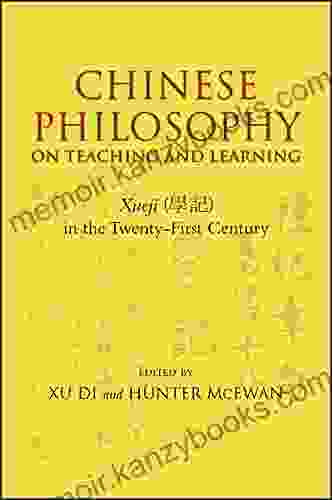Unveiling Chinese Philosophy's Profound Wisdom: A Comprehensive Guide to Teaching and Learning

Chinese philosophy, with its rich history and diverse schools of thought, offers a treasure trove of insights and teachings on education. From the principles of Confucianism to the wisdom of Daoism and the teachings of Zen Buddhism, Chinese philosophy provides a comprehensive framework for fostering effective teaching and learning practices.
4.7 out of 5
| Language | : | English |
| File size | : | 21974 KB |
| Text-to-Speech | : | Enabled |
| Screen Reader | : | Supported |
| Enhanced typesetting | : | Enabled |
| Word Wise | : | Enabled |
| Print length | : | 182 pages |
The Confucian Tradition: Cultivating Virtue and Benevolence
Confucianism, founded by the philosopher Confucius in the 6th century BCE, emphasizes the importance of virtue, right conduct, and respect for tradition. In the realm of education, Confucianism places a strong focus on:
- Character development: Teachers are seen as role models for students, guiding them in developing moral virtues such as benevolence, righteousness, propriety, wisdom, and trustworthiness.
- Respect for authority: Students are expected to show respect for their teachers and elders, as this fosters a harmonious learning environment.
- Classical texts: Confucian education重视es the study of classical texts, such as the Analects and the Book of Rites, which provide a foundation for moral conduct and interpersonal relationships.
The Daoist Perspective: Fostering Harmony and Balance
Daoism, founded by the philosopher Lao Tzu, emphasizes the importance of living in harmony with nature and the Dao, or the Way. In education, Daoism promotes:
- Natural learning: Daoist teachers believe that children have an innate capacity for learning and that education should facilitate their natural development.
- Creativity and imagination: Daoism encourages students to explore their creativity and imagination, as these are essential for holistic growth.
- Non-interference: Teachers are advised to adopt a non-interfering approach, allowing students to learn at their own pace and discover their own path.
The Wisdom of Zen Buddhism: Cultivating Mindfulness and Self-Awareness
Zen Buddhism, a branch of Mahayana Buddhism, emphasizes the importance of meditation, mindfulness, and self-awareness. In education, Zen Buddhism promotes:
- Present-moment awareness: Zen teachers encourage students to be present in the moment, focusing on their breath and bodily sensations.
- Critical thinking: Zen Buddhism encourages students to question their beliefs and assumptions, fostering critical thinking skills.
- Self-cultivation: Zen education emphasizes self-cultivation, where students are guided to develop their potential and become more mindful and compassionate individuals.
Holistic Education: Nurturing the Whole Person
Chinese philosophy emphasizes the importance of holistic education that nurtures the whole person, both intellectually and spiritually. This includes:
- Emotional intelligence: Chinese philosophy recognizes the importance of emotions and encourages students to develop their emotional intelligence.
- Physical well-being: Traditional Chinese medicine and martial arts are often incorporated into education to promote physical health and well-being.
- Social responsibility: Chinese philosophy emphasizes the importance of social harmony and ethical behavior, encouraging students to become responsible and compassionate citizens.
Harmonizing Relationships: Fostering a Supportive Learning Environment
Chinese philosophy emphasizes the importance of harmonizing relationships between teachers and students, and among students themselves. This includes:
- Respect and trust: Teachers are expected to treat students with respect and trust, creating a safe and supportive learning environment.
- Communication: Open and honest communication is encouraged to foster understanding and resolve conflicts.
- Collaboration: Teachers and students are encouraged to collaborate and learn from each other, creating a dynamic and interactive learning atmosphere.
: Embracing Chinese Philosophy's Wisdom for Effective Teaching and Learning
Chinese philosophy offers a rich and comprehensive framework for effective teaching and learning. By embracing the principles of Confucianism, Daoism, Zen Buddhism, and holistic education, educators can foster a supportive and transformative learning environment that nurtures the whole person. From cultivating virtue to promoting creativity, from fostering mindfulness to harmonizing relationships, Chinese philosophy provides profound wisdom that can guide us in creating truly effective educational experiences.
In addition to the insights provided in this article, there are numerous books and resources available for those who wish to delve deeper into Chinese philosophy's teachings on education. These resources offer practical guidance on how to integrate Chinese philosophical principles into teaching practices and create a truly holistic learning environment.
By embracing the wisdom of Chinese philosophy, we can empower educators and students alike to reach their full potential and create a more just, harmonious, and compassionate world.
Recommended Readings
- Teaching and Learning in Chinese Philosophy by Xinzhong Yao
- Education in Chinese Civilization by Xueqin Liu
- Confucian Education in the Modern World by William Theodore de Bary, Irene Bloom, and Joseph Adler
Image credits:
- Confucius statue by geralt
- Yin-Yang symbol by tookapic
- Zen garden by PublicDomainPictures
4.7 out of 5
| Language | : | English |
| File size | : | 21974 KB |
| Text-to-Speech | : | Enabled |
| Screen Reader | : | Supported |
| Enhanced typesetting | : | Enabled |
| Word Wise | : | Enabled |
| Print length | : | 182 pages |
Do you want to contribute by writing guest posts on this blog?
Please contact us and send us a resume of previous articles that you have written.
 Book
Book Novel
Novel Page
Page Chapter
Chapter Text
Text Story
Story Genre
Genre Reader
Reader Library
Library Paperback
Paperback E-book
E-book Magazine
Magazine Newspaper
Newspaper Paragraph
Paragraph Sentence
Sentence Bookmark
Bookmark Shelf
Shelf Glossary
Glossary Bibliography
Bibliography Foreword
Foreword Preface
Preface Synopsis
Synopsis Annotation
Annotation Footnote
Footnote Manuscript
Manuscript Scroll
Scroll Codex
Codex Tome
Tome Bestseller
Bestseller Classics
Classics Library card
Library card Narrative
Narrative Biography
Biography Autobiography
Autobiography Memoir
Memoir Reference
Reference Encyclopedia
Encyclopedia Kirsten Hartvig
Kirsten Hartvig Andrea Cason
Andrea Cason Andrea Raimondi
Andrea Raimondi Amy S Kinser
Amy S Kinser Lorie Dechar
Lorie Dechar Amber Carwile
Amber Carwile Mike Bryant
Mike Bryant Andrea Lynn
Andrea Lynn Amy Zerner
Amy Zerner Andrea Malzone
Andrea Malzone Amit Sengupta
Amit Sengupta Amit Batla
Amit Batla Nadia Kiwan
Nadia Kiwan Amira Nowaira
Amira Nowaira Duff Goldman
Duff Goldman Nagraj Balakrishnan
Nagraj Balakrishnan Randy Clemens
Randy Clemens Annalise G Roberts
Annalise G Roberts Amy White
Amy White Franco Columbu
Franco Columbu
Light bulbAdvertise smarter! Our strategic ad space ensures maximum exposure. Reserve your spot today!

 Jarrett BlairSOS Save Our Sleep: The Ultimate Guide to Getting Your Baby to Sleep Through...
Jarrett BlairSOS Save Our Sleep: The Ultimate Guide to Getting Your Baby to Sleep Through...
 Virginia WoolfAuthor Platform Building Blocks: The Ultimate Guide to Building a Successful...
Virginia WoolfAuthor Platform Building Blocks: The Ultimate Guide to Building a Successful...
 Jeff FosterThe Art and Business of Teaching Yoga: A Comprehensive Guide to Empower Yoga...
Jeff FosterThe Art and Business of Teaching Yoga: A Comprehensive Guide to Empower Yoga... Gary CoxFollow ·19.8k
Gary CoxFollow ·19.8k Jaden CoxFollow ·11.2k
Jaden CoxFollow ·11.2k Adrian WardFollow ·18.1k
Adrian WardFollow ·18.1k Chance FosterFollow ·16.1k
Chance FosterFollow ·16.1k Grayson BellFollow ·14.1k
Grayson BellFollow ·14.1k Hamilton BellFollow ·11.1k
Hamilton BellFollow ·11.1k Aleksandr PushkinFollow ·3.1k
Aleksandr PushkinFollow ·3.1k Brian WestFollow ·10.9k
Brian WestFollow ·10.9k

 Miguel Nelson
Miguel NelsonFour Cookbooks In One: Recipes To Fight Cancer, Heart...
Looking for a healthy way...

 Marcus Bell
Marcus BellHearts and Souls: Exploring the Lives and Legacies of...
The Special Olympics movement has been a...

 Tony Carter
Tony CarterDiagnosed With Breast Cancer: Navigating Life After the...
A breast cancer diagnosis can be a...

 Joe Simmons
Joe SimmonsLiddypool: The Stories and Interviews – A Literary...
In the realm of...

 Jett Powell
Jett PowellBreakfast for Boneheads: 66 Breakfast Recipes for Lazy...
Are you tired of eating the...
4.7 out of 5
| Language | : | English |
| File size | : | 21974 KB |
| Text-to-Speech | : | Enabled |
| Screen Reader | : | Supported |
| Enhanced typesetting | : | Enabled |
| Word Wise | : | Enabled |
| Print length | : | 182 pages |








